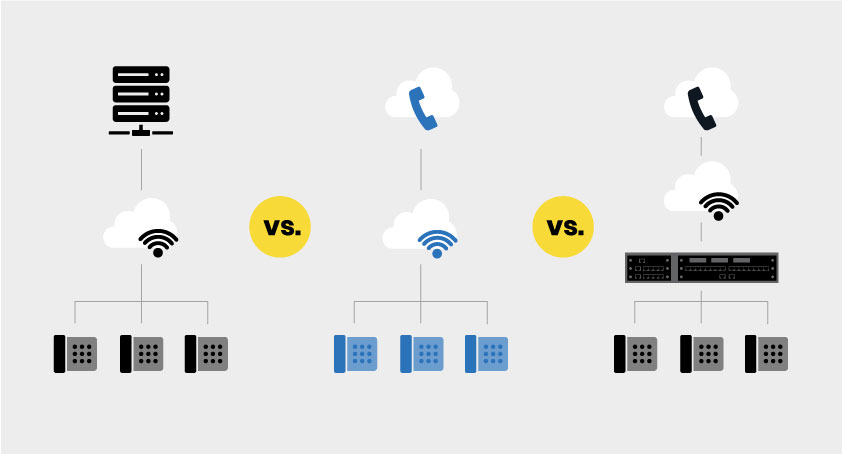Hosted VoIP vs Cloud VoIP vs VoIP PBX: What’s the difference?

Finding a new phone system for your business sounds easy enough, right? There are phones, and phone services, and companies that provide them. Boom, done. All of your work should be this easy, right?
Well, slow your roll just a bit. How aware are you of the technology improvements offered by Next Gen VOIP and PBX box providers over the traditional analog systems? If you are still using an analog system, all the bells and whistles that come with the newer platforms can seem daunting, confusing and even unnecessary.
Don’t you worry though. Your ol’ pal Brady is here to hold your hand and help you understand what’s going on. I’m an certified expert in cutting through the jargon and helping businesses understand which tech is right. Sit back, buckle up and enjoy the ride.
I’m here to help you understand why the whole business world is obsessed with a fancy internet phone technology called VoIP (voice over internet protocol) that gives you better service and more features for way less money than you were budgeting.
If you’ve already started researching VoIP and found yourself surrounded by unfamiliar, but similar terms like Hosted VoIP, Cloud VoIP, and VoIP PBX. Don’t panic! I’m here to guide you through the brave new world of telecommunications terms and show you how easy picking a new phone system can be.
WHAT IS HOSTED VOIP?
Hosted VoIP refers to business phone service where all the equipment, servers and data for your phone system is hosted by the system provider and then routed through a customer’s network to their devices.
WHAT IS CLOUD VOIP?
Cloud VoIP refers to business phone service where the phone system, equipment, servers and data are hosted by the system provider in a cloud environment like Amazon Web Services (AWS) or Microsoft Azure and then similarly routed through a customer’s network to their devices.
WAIT… SO HOW ARE THOSE DIFFERENT?
The short answer is, they really aren’t!
Both “Hosted” and “Cloud” signify that the phone system is housed off-premises and does not need equipment or maintenance onsite to function. VoIP service can technically still be hosted remotely without the use of cloud storage, but doing so ignores all the benefits of modern networking technology.
For everyday purposes, Hosted VoIP and Cloud VoIP can be used and understood interchangeably.
WHAT ARE THE BENEFITS OF HOSTED / CLOUD VOIP?

Quick and Simple Setup
With either type of VoIP solution, all of your phone system hardware is hosted by the provider. That means there’s no new equipment to purchase. You just tell your new provider how you want the phone system to function and watch them build it for you.
Depending on how complicated your phone system needs to be, setup can be finished in under a single day.
Remote Maintenance
You’ll never need to bring in an IT tech to maintain or update a Cloud VoIP system because, well, there’s nothing in your office to maintain or update. It’s all hosted remotely by your provider, which means all the maintenance takes place on their end as well. If you need to make changes to your phone system, just give your provider a call or log into your web portal and update any part of your system in minutes.
Troubleshooting devices or changing which phone belongs to which employee happens just as easily, all without downtime or spending a dime on outside help.
Increased Scalability
Since all of your extensions and features are hosted online rather than on a physical device, adding users or making changes is as easy as clicking a button.
Most Cloud VoIP providers even have flexible pricing plans that don’t require a contract, giving you more financial flexibility to focus your budget on your business.
Easy Integrations
Having a phone system that can integrate seamlessly with CRM software and automation platforms like Salesforce and Zoho opens up a new world of possibilities. Wouldn’t you love to know how many times Irate Customer A called and complained about your soggy cookies?
Wouldn’t you also love to be able to quickly run a report to quantify those instances and even listen to those calls individually - all from within your CRM? With a Cloud VoIP system, every phone call or touchpoint is automatically logged so you can track interactions over time and improve your ability to serve your customers.
Advanced Sales and Support Features
While Cloud VoIP systems are great for any business, providing value for your sales and support teams is where they truly shine. Advanced features like support queues, dialing sales prospects from local numbers, automatically routing calls by their zip code, and detailed reporting give your teams an edge and provide a better experience for your customers.

Usable Anywhere on Any Device
Since Cloud VoIP extensions and features aren’t tied to physical devices, you can take your entire business phone system with you wherever you go.
Mobile apps, browser dialers and softphones allow you to turn any cell phone or computer into a remote office, making it easy to work from home or keep in touch with customers after hours. Don’t worry though, your deskphone will still work too.AREN’T YOU FORGETTING VOIP PBX?
You’re correct, dear reader, I did forget VoIP PBX. In my defense though, the world is quickly forgetting about VoIP PBX too. Let’s take a look at why.
WHAT IS VOIP PBX?
VoIP PBX is a private branch exchange system that switches calls between VoIP users and analog users on local lines while allowing all users to share external phone lines. Unlike Hosted/Cloud VoIP, VoIP PBX still uses physical equipment that must be installed and maintained at your office.
They are often found at companies where the older analog infrastructure is considered too expensive to replace, but they still want to take advantage of VoIP savings and features as much as possible.
The problem with VoIP PBX is that, rather than pushing business communications forward, it instead serves as a stopgap between outdated analog infrastructure and modern cloud-hosted platforms. Depending on the unique needs of your business, VoIP PBX may still be a viable option. However, as PBX box hardware becomes more difficult to purchase and maintain, you may find yourself again looking into new solutions sooner than you’d like.
For additional information about how cloud-hosted VoIP can benefit your business, contact us at sales@fluentstream.com or by calling 303-GO-CLOUD and selecting Option 1.
Finding a new phone system for your business sounds easy enough, right? There are phones, and phone services, and companies that provide them. Boom, done. All of your work should be this easy, right?
Well, slow your roll just a bit. How aware are you of the technology improvements offered by Next Gen VOIP and PBX box providers over the traditional analog systems? If you are still using an analog system, all the bells and whistles that come with the newer platforms can seem daunting, confusing and even unnecessary.
Don’t you worry though. Your ol’ pal Brady is here to hold your hand and help you understand what’s going on. I’m an certified expert in cutting through the jargon and helping businesses understand which tech is right. Sit back, buckle up and enjoy the ride.
I’m here to help you understand why the whole business world is obsessed with a fancy internet phone technology called VoIP (voice over internet protocol) that gives you better service and more features for way less money than you were budgeting.
If you’ve already started researching VoIP and found yourself surrounded by unfamiliar, but similar terms like Hosted VoIP, Cloud VoIP, and VoIP PBX. Don’t panic! I’m here to guide you through the brave new world of telecommunications terms and show you how easy picking a new phone system can be.
WHAT IS HOSTED VOIP?
Hosted VoIP refers to business phone service where all the equipment, servers and data for your phone system is hosted by the system provider and then routed through a customer’s network to their devices.
WHAT IS CLOUD VOIP?
Cloud VoIP refers to business phone service where the phone system, equipment, servers and data are hosted by the system provider in a cloud environment like Amazon Web Services (AWS) or Microsoft Azure and then similarly routed through a customer’s network to their devices.
WAIT… SO HOW ARE THOSE DIFFERENT?
The short answer is, they really aren’t!
Both “Hosted” and “Cloud” signify that the phone system is housed off-premises and does not need equipment or maintenance onsite to function. VoIP service can technically still be hosted remotely without the use of cloud storage, but doing so ignores all the benefits of modern networking technology.
For everyday purposes, Hosted VoIP and Cloud VoIP can be used and understood interchangeably.
WHAT ARE THE BENEFITS OF HOSTED/CLOUD VOIP?

Quick and Simple Setup
With either type of VoIP solution, all of your phone system hardware is hosted by the provider. That means there’s no new equipment to purchase. You just tell your new provider how you want the phone system to function and watch them build it for you.
Depending on how complicated your phone system needs to be, setup can be finished in under a single day.
Remote Maintenance
You’ll never need to bring in an IT tech to maintain or update a Cloud VoIP system because, well, there’s nothing in your office to maintain or update. It’s all hosted remotely by your provider, which means all the maintenance takes place on their end as well. If you need to make changes to your phone system, just give your provider a call or log into your web portal and update any part of your system in minutes.
Troubleshooting devices or changing which phone belongs to which employee happens just as easily, all without downtime or spending a dime on outside help.
Increased Scalability
Since all of your extensions and features are hosted online rather than on a physical device, adding users or making changes is as easy as clicking a button.
Most Cloud VoIP providers even have flexible pricing plans that don’t require a contract, giving you more financial flexibility to focus your budget on your business.
Easy Integrations
Having a phone system that can integrate seamlessly with CRM software and automation platforms like Salesforce and Zoho opens up a new world of possibilities. Wouldn’t you love to know how many times Irate Customer A called and complained about your soggy cookies?
Wouldn’t you also love to be able to quickly run a report to quantify those instances and even listen to those calls individually - all from within your CRM? With a Cloud VoIP system, every phone call or touchpoint is automatically logged so you can track interactions over time and improve your ability to serve your customers.
Advanced Sales and Support Features
While Cloud VoIP systems are great for any business, providing value for your sales and support teams is where they truly shine. Advanced features like support queues, dialing sales prospects from local numbers, automatically routing calls by their zip code, and detailed reporting give your teams an edge and provide a better experience for your customers.

Usable Anywhere on Any Device
Since Cloud VoIP extensions and features aren’t tied to physical devices, you can take your entire business phone system with you wherever you go.
Mobile apps, browser dialers and softphones allow you to turn any cell phone or computer into a remote office, making it easy to work from home or keep in touch with customers after hours. Don’t worry though, your deskphone will still work too.AREN’T YOU FORGETTING VOIP PBX?
You’re correct, dear reader, I did forget VoIP PBX. In my defense though, the world is quickly forgetting about VoIP PBX too. Let’s take a look at why.
WHAT IS VOIP PBX?
VoIP PBX is a private branch exchange system that switches calls between VoIP users and analog users on local lines while allowing all users to share external phone lines. Unlike Hosted/Cloud VoIP, VoIP PBX still uses physical equipment that must be installed and maintained at your office.
They are often found at companies where the older analog infrastructure is considered too expensive to replace, but they still want to take advantage of VoIP savings and features as much as possible.
The problem with VoIP PBX is that, rather than pushing business communications forward, it instead serves as a stopgap between outdated analog infrastructure and modern cloud-hosted platforms. Depending on the unique needs of your business, VoIP PBX may still be a viable option. However, as PBX box hardware becomes more difficult to purchase and maintain, you may find yourself again looking into new solutions sooner than you’d like.
For additional information about how cloud-hosted VoIP can benefit your business, contact us at sales@fluentstream.com or by calling 303-GO-CLOUD and selecting Option 1.
Visited 675 Times, 3 Visits today


